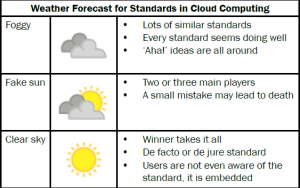Nowadays’ buzz word is Cloud Computing. In the near future, all users are expected to have only LCD screens, keyboard and an Internet Access to perform their daily routine tasks in business and social life. This means a shift from decentralization, where each individual has the whole power, to a centralization, where all control is in the hands of the main players of the web. These main players will provide services mainly in three categories: Infrastructure as a Service (IaaS), Platform as a Service (PaaS), and Software as a Service (SaaS).So if users will just need a dummy terminal to perform all their tasks, and there are a few main players, who will control all the web like oligarchy, the word ‘standard’ may lose its meaning? Let us try to answer this question by imagining our future daily life. Here we go:
- Enter the office
- Open your dummy terminal
- Check your emails from self-customized gmail specific to your company’s needs
- Generate a spread sheet from Google Docs to analyze your sales figures and just click share button to send them to your colleques
- Watch your favourite clips from your customized You-Tube library and share them and so on …
This scenario seems similar to the one that we experienced twenty years ago, when we connected to mainframes via dummy terminals with greenish screens, doesn’t it? This scenario may lead you to think that there is less need for standards, since everything is under the control of a few players who will agree easily on a common standard and our lives will be very easy. This may be the case in the mature ages of cloud computing, but not in its childhood stages. Let us make some analogies:
- In 1899, there were 2000 local telephone companies in US many, all of which were running their own standards of transmission
- In 1890, electricity came in a variety of voltages and frequencies
Today, we never even think about the standard of electricity we have to use while travelling among cities, which are not only in the same country but also on different continents. The standards have been reduced to two: 110 V and 220 V, and it becomes very easy to convert between these voltages with a simple, cheap appliance. But the way to come up to this consolidation is a hard drive, where many companies and standards have disappeared or been acquired by their competitors. So the weather forecast for standards during this cloudy hard drive would probably be:
Let us check the ground in this foggy weather during today’s initial stages:
-Google: born as a pure cloud company is now expanding its roots by giving
Android and Chrome OS away as open source, and Google Docs
-Microsoft: once a very closed network company now supports many open standards.Bing search engine initiative is a move to get stake in search engine market to promote its future cloud offerings
-Apple: another company who has strong roots in cloud is now building a $1 billion data center in North Carolina to handle its future cloud services.
This changing weather will trigger a chain reaction in all disciplines, especially in testing, where there is heavy fog over its own standard test process models , such as Test Maturity Model (TMMi), Systematic Test and Evaluation Process (STEP), Critical Testing Processes (CTP) and Test Process Improvement (TPI). These models are used for test process improvement and are still in the early stages of their lifecycles. They should be very carefully chosen while selecting which hill to climb, since in these turbulent times it is very difficult to discern which hills are highest and which summits are false. Cloud computing will blow unexpected winds, which may change the foggy areas. So our answer to the above topic is ‘Yes. We will need standards even more, but we have to wait a little bit for the mature one.’
Biography:
Koray Yitmen has been working as a Managing Partner at Keytorc Software Testing Services ( www.keytorc.com ) since 2004. He is a board member of ISTQB (International Software Testing and Qualifications Board), and he is the President of the Turkish Testing Board. Formerly, he worked as a consultant in various technology and business consulting projects for local and international clients during his engagement at Andersen, Accenture and Booz Allen Hamilton. He holds a B.Sc. degree in Computer Science from Middle East Technical University, Turkey and MBA degree in Entrepreneurship from Babson College, USA. He has published many articles about software testing and given speeches at many software testing conferences. He is a strong supporter of the importance of software testing and tries to achieve his vision through conducting seminars and workshops at various non-profit organizations.


